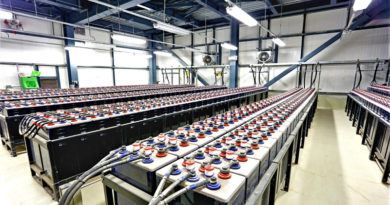Global Carbon Capture Projects Up by 52%: Global CCS Institute
 Carbon Credit Trading Scheme In The Works By Indian Ministries
Carbon Credit Trading Scheme In The Works By Indian Ministries
A new climate report released by the Global CCS Institute has highlighted the continuing growth of carbon capture and storage (CCS) worldwide. As of September, the CO2 capture capacity of all CCS facilities under development has grown from 73 million tonnes per annum (Mtpa) to 111 Mtpa – a 52 per cent increase over 2020.
In 2021, the total capacity of the CCS project-pipeline increased for the fourth year in a row, by almost one third over the previous year. CEO of the Global CCS Institute, Jarad Daniels, said the dramatic increase in projects in development reinforces the critical role of CCS in reaching global climate goals within the short timeframe required.
CCS is considered by many advocates, including the International Energy Agency, as an essential element of achieving the world’s climate change goals. Critics, however, say that CCS is a waste of money and will prolong the life of dirty fossil fuels. They argue that the technology remains too unproven to be a viable strategy, highlighting a number of objections: there is no way of knowing if stored carbon will remain underground indefinitely; injection could contaminate groundwater supplies or trigger earthquakes; the process is very expensive, energy-intensive and decreases the EROI of coal.
“CCS is absolutely critical to achieving net zero emissions and we anticipate growth in the sector to continue as climate ambition is increasingly matched with action,” said Mr. Daniels.
“Although much more is required, commitment to climate action is progressing steadily and we’re seeing growing interest and support for CCS. As we accelerate toward net zero emissions by mid-century and establish clearer interim targets, CCS will be integral to the decarbonisation of energy, industrial sectors such as cement, fertilisers, and chemicals, and will open new opportunities in areas including clean hydrogen and carbon dioxide removal.”
The flagship Global Status of CCS report provides a global snapshot of CCS progress around the world. The 2021 report shows:
- Of the 135 commercial CCS facilities in the project pipeline, 27 are fully operating, 4 are under construction, and 102 are under development.
- 71 new CCS facilities were added to the project pipeline in 2021.
- As of September, the CO2 capture capacity of all CCS facilities under development has grown from 73 million tonnes per annum (Mtpa) to 111 Mtpa – a 52 per cent increase over 2020.
- North America continues to be the global front runner in CCS deployment, with over 40 new CCS projects announced in 2021. This can largely be attributed to CCS tax credits, stronger climate commitments – including the US re-joining the Paris Agreement – and anticipated rise in demand for low-carbon energy products.
- CCS projects are becoming increasingly diverse, with facilities in development in a broad range of sectors including power generation, liquefied natural gas (LNG), cement, steel, waste-to-energy, direct air capture and storage and hydrogen production.
- Several new countries now have commercial CCS facilities under development, including Belgium, Denmark, Hungary, Indonesia, Italy, Malaysia, and Sweden.
- CCS networks – in which multiple emissions sources share transport and storage infrastructure – are increasingly becoming the dominant operating model, incorporating ever-larger volumes of CO2.
“The momentum we have seen over the last year towards CCS is considerable, however more is required if we are to reach climate goals”, said Guloren Turan, General Manager of Advocacy and Communication at the Global CCS Institute.
“The International Energy Agency’s Sustainable Development Scenario foresees 15% of emissions reductions to come from CCS, requiring a one-hundred-fold increase in the capacity of operational facilities by 2050. While the acceleration of CCS adoption is promising, more urgency in the deployment of the technology is needed to reach 2050 climate goals,” added Turan.
The release of the Global Status of CCS report comes ahead of COP 26, where government leaders and observer organisations – including the Global CCS Institute – gather to assess progress on climate commitments and encourage greater ambition and action.
Released annually, the Status Report is published by the Global CCS Institute, an international think tank working to accelerate the deployment of CCS, a vital technology to tackle climate change.




